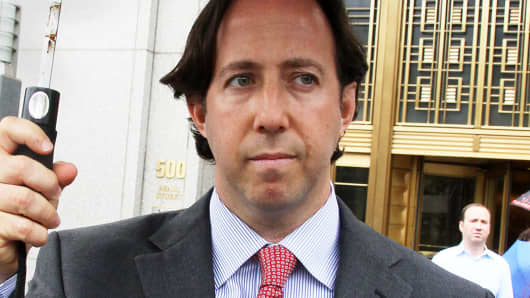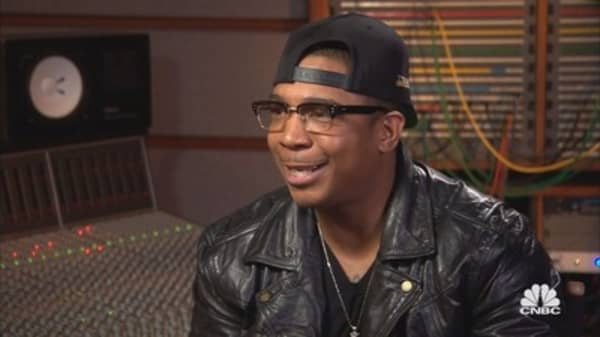At the end of 2002, my portfolio manager asked me to come into the CFO's office. "I need you to sign this," he said. My hedge fund had received an inquiry from the SEC on a particular stock we bought that I traded. The security in question had been upgraded just minutes after I purchased it. Ironically the broker I bought it from was the same broker who upgraded the stock. Sounded fishy to me … and my signature was confirmation we had no previous knowledge of the research call.
Read MoreBuh-bye, Wall Street! I'm a lot happier now
I legitimately hadn't done anything wrong — well, at least on this particular trade. As I signed the document, I got an uneasy feeling. Perhaps it was the waters I was swimming in. But playing it fast and loose seemed almost commonplace. As I slowly walked back to my desk I had visions of orange jumpsuits and barbwire electrical fences. The fear took over.
I never went to prison. But for some; their worst fear becomes a reality.
Recently I spoke with Mike Kimelman, who co-founded Incremental Capital, a proprietary-trading firm. On a November day at 5:30 a.m., he was greeted by a half-dozen federal agents with German Shepherds. His then-wife and children were sequestered in the master bedroom while he was charged for conspiracy and illegally trading shares of 3Com in 2007.
"The fear never goes away, it was just a debilitating low-level constant that ate away at my psyche and my overall being," Kimelman said about awaiting his trial.
His role was minimal enough that prosecutors offered him a deal shortly after his arrest in 2009. That means he could have avoided prison time by accepting the plea deal and probation. But, like many people who think they can fight it, he rejected the offer and took his case to trial. That decision landed him in prison. He served 21 months.
A lot of people think when white-collar criminals get convicted; they go to a prison lite, or as some like to call it "Club Fed," a play on Club Med. But Kimelman says prison wasn't easy.
"A guy on the inside who blamed me for his conviction did everything possible to jack my time, from putting a bounty on me to bragging to the other inmates that he had hired someone on the outside to rape my 8-year-old daughter, and then promised he would rape her again personally when he got out," Kimelman said. "From a societal point of view, I learned what an abject disgrace our prison system is (really the entire criminal-justice system). While I get that it's supposed to be punitive, I find it hard to believe that the American public would allow it to exist in its present state if they knew what it was like."
Read MoreQ&A with Mike Kimelman: How prison changes you
I also corresponded with Stephen Maiden, who is on his way to prison. He was recently sentenced to seven years for securities fraud as well as ordered to pay restitution. He founded Maiden Capital Opportunity Fund in 2006. His charges sound more like a Ponzi scheme than insider trading. He faced up to 20 years for costing investors at least $8.9 million.
"My biggest fears are about being away from my family. How it will impact them. There is no road map for this stuff. This is the collateral damage I never envisioned when I made some selfish, delusional decisions years ago that led down the wrong path," Maiden said via email.
Those two cases are like comparing former Galleon Group founder Raj Rajaratnam to Bernie Madoff. There's a big difference. Insider trading isn't as easy to define as a Ponzi scheme.
And a clear line has been drawn in the sand pre- and post-arrest of Rajaratnam, who was found guilty on 14 counts of conspiracy and securities fraud in 2011. He was sentenced to 11 years in prison. "The entire industry is (was) based on the flow of information. There's a huge difference between hearing fourth-hand that CSCO might get upgraded to Raj getting a call directly from a Goldman Sachs board member. One is an unverifiable rumor, the other is a breach," Kimelman said.
A fourth-hand rumor is very common on Wall Street. I know from my own experience there was an endless flow of rumors, potential takeovers, upgrades, downgrades and whispers all around. You never really knew what was legit. But the ambiguity of what was considered insider trading always cast a shadow of wrongdoing. It wasn't easy to figure out.
Read MoreTurney Duff: The truth about insider trading
"As a former M&A lawyer, I had studied the field extensively and it had been drilled into my head what was permitted and what wasn't. As long as you didn't know (or shouldn't know) the info you were hearing was coming from someone breaching a fiduciary duty, it was playable," Kimelman said. And it's true — those are the rules, but it doesn't come without worry.
Fear not only tortures those who partake in insider trading; it also acts as a deterrent to commit the crime. And when you hear stories like Mike Kimelman's, it makes you wonder: How close are you to going prison?





